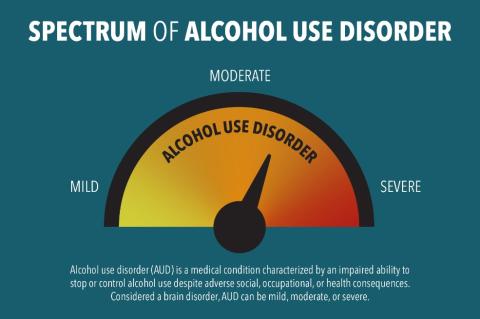Alcohol- Related Disorders
Alcohol is produced when certain yeasts react with sugar and water and fermentation takes place. Historically, we have been creative about fermenting alcohol from just about any fruit and vegetable, partly because many foods contain sugar. Alcohol drinks have included mead from honey, sake from rice, wine from palm, mescal and pulque from agave and cactus, liquor from maple syrup, liquor from south American jungle fruits, wine from grapes, and beer from grains.

Introduction:
Alcohol-related disorders encompass a range of conditions that arise from the excessive and problematic consumption of alcohol. These disorders can have significant physical, mental, and social consequences, impacting individuals, families, and communities. This article aims to provide a comprehensive overview of alcohol-related disorders, including their types, causes, symptoms, and potential treatment options.
Clinical Description
Apparent stimulation is the preliminary impact of alcohol, even though it is a depressant. We typically revel in a sense of well-being our inhibitions are decreased, and we end up greater outgoing. That is because the inhibitory facilities within the mind are initially depressed or slowed. With persisted consuming, however, alcohol depresses more regions of the mind, which impedes the capability to characteristic well. Motor coordination is impaired, response time is slowed, we end up burdened, our ability to make judgements is reduced, and even imaginative and prescient and listening to may be negatively affected, all of which help give an explanation for why riding even as intoxicated is simply danger.

Types of Alcohol-Related Disorders:
- Alcohol Use Disorder (AUD):
- AUD is a chronic relapsing disorder characterized by an impaired ability to control or stop drinking despite adverse consequences.
- Symptoms include a strong desire to drink, tolerance, withdrawal symptoms, and continued alcohol use despite awareness of its negative effects.
- Alcohol Intoxication:
- This occurs when an individual consumes alcohol to the extent that it leads to impaired physical or mental functioning.
- Symptoms may include slurred speech, impaired coordination, slowed reaction time, and altered judgment.
- Alcohol Withdrawal:
- Withdrawal symptoms occur when an individual who is physically dependent on alcohol suddenly reduces or stops drinking.
- Symptoms range from mild anxiety and insomnia to severe complications like seizures and delirium tremens.
- Fetal Alcohol Spectrum Disorders (FASD):
- FASD refers to a range of developmental disorders that can occur in an individual whose mother drank alcohol during pregnancy.
- It can lead to physical, cognitive, and behavioral abnormalities, affecting a child’s overall development.

Causes of Alcohol-Related Disorders:
- Genetic Factors:
- Some individuals may be genetically predisposed to developing alcohol-related disorders.
- Family history of alcoholism can increase the risk of AUD.
- Psychological Factors:
- Mental health conditions such as depression, anxiety, and stress can contribute to alcohol misuse.
- Individuals may use alcohol as a coping mechanism for emotional issues.
- Social and Environmental Factors:
- Societal and environmental influences, such as peer pressure, cultural norms, and availability of alcohol, play a role in alcohol-related disorders.
- Adverse childhood experiences can also contribute to the development of these disorders.
- Neurochemical Factors:
- Alcohol affects neurotransmitters in the brain, leading to changes in mood and behavior.
- Over time, the brain may adapt to the presence of alcohol, leading to increased tolerance and dependence.

Treatment Options:
- Detoxification:
- Medically supervised detox helps individuals safely manage withdrawal symptoms.
- It is an essential first step in the treatment process.
- Behavioral Therapies:
- Cognitive-behavioral therapy (CBT), motivational enhancement therapy (MET), and contingency management are effective in treating AUD.
- These therapies address the underlying thoughts, behaviors, and motivations associated with alcohol misuse.
- Medications:
- Medications such as disulfiram, naltrexone, and acamprosate can help individuals reduce alcohol cravings and maintain sobriety.
- Medication-assisted treatment is often used in conjunction with behavioral therapies.
- Support Groups:
- Participation in support groups like Alcoholics Anonymous (AA) provides individuals with a sense of community and encouragement from peers who share similar experiences.
Diagnostic Criteria for Alcohol Use Disorder
A intricate pattern of alcohol use main to clinically extensive impairment or misery, as manifested at least two of the subsequent going on within a 12 month duration.
- Alcohol is frequently absorb large amounts or over an extended duration than became supposed.
- There may be a chronic choice or unsuccessful efforts to reduce down or control alcohol use.
- A first-rate deal of time is spent in sports vital to gain alcohol, use alcohol, or recover from its results.
- Craving or a sturdy preference or urge to use alcohol.
- Recurrent alcohol use ensuing in a failure to fulfil essential position responsibility at paintings, faculty, or domestic.
- Continued alcohol use in spite of having persistent or recurrent social or interpersonal troubles induced or exacerbated by using the outcomes of alcohol.
- Vital social , occupational, or recreational activities are given up or decreased because of alcohol use.
- Recurrent alcohol use in situations wherein it is physically risky.
- Alcohol use is sustained regardless of information of having a continual or recurrent bodily or psychological problem that is probably to have been precipitated or exacerbated by means of alcohol.

Conclusion:
Alcohol-related disorders pose significant challenges to individuals and society as a whole. Understanding the types, causes, and available treatment options is crucial for addressing and managing these disorders effectively. Early intervention, a holistic approach to treatment, and ongoing support are essential components in helping individuals overcome alcohol-related challenges and achieve lasting recovery.

